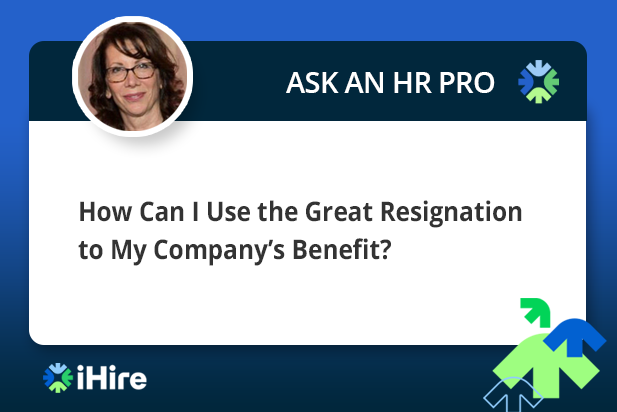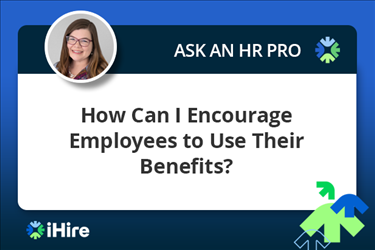- Employer Resources
- |
- Last Updated: January 18, 2022

Ask an HR Pro: How Can I Use the Great Resignation to My Company’s Benefit?
The Great Resignation has been affecting businesses across America for months now, causing countless headaches for HR teams. If you’re one of the lucky few who hasn’t been impacted by this phenomenon and aren’t sure what it is, the “Great Resignation” is a term describing a mass exodus from the labor force as employees voluntarily quit their jobs – first predicted by Anthony Klotz from Texas A&M before the COVID-19 pandemic – that became a reality in 2021.
For example, 4.5 million U.S. workers voluntarily quit in November alone, and according to iHire’s 2021 Talent Retention Report, 31.4% of employees left a job voluntarily from September 2020 through September 2021.
These high turnover rates sound dire, but is there a way to turn the “Big Quit” into an opportunity?
iHire Senior Human Resources Consultant, Chrisanne Bowden, is here to show you how to benefit from the Great Resignation in this edition of “Ask an HR Pro.”
“While it may seem like a crisis right now, the Great Resignation gives us the opportunity to turn things into the Great Recruitment by attracting new talent, as well as fix what might not be working at the company.” Bowden said.
But first, you need to understand why employees are leaving.
Why People Are Quitting Their Jobs
Bowden laid out three main reasons workers are resigning:
- An abundance of jobs available
- Burnout at their current jobs
- Desire to focus on their families
While those may be the main underlying reasons for the Great Resignation, other smaller pieces can add up and cause staff members to quit. Many employees want increased workplace flexibility, better communication, more appreciation, and meaningful work, and will leave if they think they can get those perks elsewhere.
Having a say in their careers is also very important. If employees feel like they have no defined career path or development plan – and a lack of power, control, trust, flexibility, or fun – they’ll seek other opportunities.
Assessing what sets your company apart, what you’re doing right, and what you’re doing wrong will help you determine why people are quitting their jobs.

How to Reduce Turnover
Because your employees have different goals depending on where they are in their careers, Bowden recommends building your HR strategy to reduce turnover around each career stage.
For example, for people early in their career, creating a career development plan shows associates you are invested in their futures and gives them some control over their progress. Similarly, allowing for hybrid or remote work with flex time will let employees midway through their careers take care of their families first. Lastly, more tenured workers might be swayed to remain at your company by a robust benefits package.
“I come from the era where the expectation is that people should work their lives around their job,” Bowden commented. “We’ve evolved in the other direction now, and it is really important that we offer people the opportunity to have not just time off if they’re unwell or need to take care of a family member, but also time away to recharge.”
In general, if your HR strategy includes increasing communication both company-wide and amongst individual teams, conducting stay interviews to gauge how employees are feeling, and creating professional development plans, you’ll be in good shape to prevent turnover.
Create Your Account Today
How to Benefit from the Great Resignation
Think of the Great Resignation as a learning opportunity to better your company for your employees. If you understand why your employees are leaving and make the changes necessary to fix those pain points, you’ll be able to turn the Great Resignation into the Great Recruitment and hire truly talented individuals.
“Positioning yourself as an employer of choice and going that extra mile is going to give you access to that top talent,” Bowden said.
To attract and retain the best hires, you have to walk the talk with your company values every day. It’s not enough to say you possess certain values; you must follow through on your claims. Bowden recommends starting with the following tactics to improve recruitment and retention:
- Rethink your office strategy with hybrid or remote work and flex time.
- Review your benefits and compensation.
- Focus on your employees’ wellbeing.
For more tips on employee engagement and retention, head to our Employer Resource Center.

Originally Published: January 18, 2022




